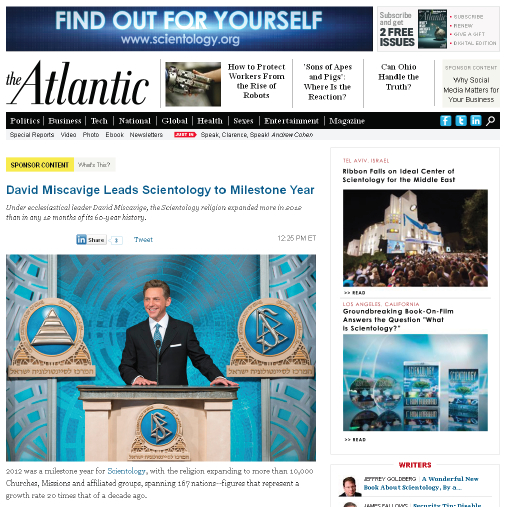The screenshot above, recently taken from The Atlantic’s website, illustrates the tension between sponsored content (sometimes referred to as advertorials or what some now call “native advertising”) and journalistic content. In this case, a piece published on January 14, 2013, and sponsored by the Church of Scientology was integrated into the website in such a way that some believed it to cross the line between journalism and advertising. The ethical problem with native advertising is that it is deceptive, insofar as it makes an advertiser appear to be more credible by “reporting” on its activities as “news.” Moreover, unless sponsored content is distinguished properly it effectively becomes what some call “pay-for-play” or paying for favorable news coverage, a practice that has been deemed as unacceptable for many, many years.
According to Zach Dyer of the Knight Center for Journalism in the Americas, The Atlantic removed the piece the next day and apologized saying “We now realize that as we explored new forms of digital advertising, we failed to update the policies that must govern the decisions we make along the way.”
The debate over native advertising itself was front and center on February 21, 2013, when The Dish’s Andrew Sullivan and BuzzFeed’s Ben Smith debated the practice of native advertising at Social Media Week 2013 in NYC. Watch the clips below uploaded by Jesse Ferrell for a portion of the debate.
Some claim that native advertising isn’t a problem, because there are disclaimers that tell readers that what they are reading is paid content. Look carefully at the screenshot above and you’ll see The Atlantic’s disclaimer in the yellow box just above the “article.” While this might make advertisers sleep better at night, it seems that disclaimers such as the one above have little chance of getting noticed amid the visual clutter that populates most websites.
Do these disclaimers go far enough in telling readers that they’re consuming sponsored content? If not, then what should websites do to ensure that they don’t “go native?”
Sources: knightcenter.utxeas.edu, adweek.com, Jesse Ferrell

